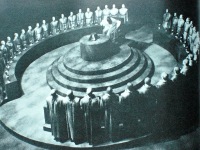Secret society
Definition
- 1: any of various oath-bound societies often devoted to brotherhood, moral discipline, and mutual assistance
Description
A secret society is a club or organization whose activities and inner functioning are concealed from non-members. The society may or may not attempt to conceal its existence. The term usually excludes covert groups, such as intelligence agencies, or guerrilla insurgencies, which hide their activities and memberships but maintain a public presence. The exact qualifications for labeling a group as a secret society are disputed, but definitions generally rely on the degree to which the organization insists on secrecy, and might involve the retention and transmission of secret knowledge, denial of membership in or knowledge of the group, the creation of personal bonds between members of the organization, and the use of secret rites or rituals which solidify members of the group.
Anthropologically and historically, secret societies are deeply interlinked with the concept of the Mannerbund, the all-male "warrior-band" or "warrior-society" of pre-modern cultures (see H. Schurtz, Alterklassen und Mannerbunde, Berlin, 1902; A. Van Gennep, The Rites of Passage, Chicago, 1960).
A purported "family tree of secret societies" has been proposed, although it may not be comprehensive.[2] The Thuggee were a secret cult of assassins who worshipped the Hindu goddess Kali.
Alan Axelrod, author of the International Encyclopedia of Secret Societies and Fraternal Orders, defines a secret society as an organization that:
- Is exclusive.
- Claims to own special secrets.
- Shows a strong inclination to favor its own.
David V. Barrett, author of Secret Societies: From the Ancient and Arcane to the Modern and Clandestine, uses slightly different terms to define what does and does not qualify as a secret society. He defines it as any group that possesses the following characteristics:
- It has "carefully graded and progressed teachings"
- Teachings are "available only to selected individuals"
- Teachings lead to "hidden (and 'unique') truths"
- Truths bring "personal benefits beyond the reach and even the understanding of the uninitiated."
Barrett goes on to say that "a further characteristic common to most of them is the practice of rituals which non-members are not permitted to observe, or even to know the existence of." Barrett's definition would rule out many organizations called secret societies; graded teaching is usually not part of the American college fraternities, the Carbonari, or the 19th century Know Nothings.[1]
